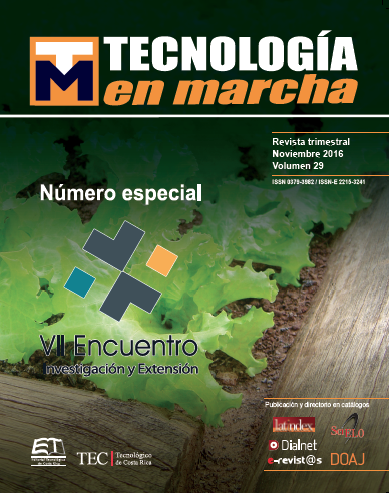Technical evaluation of two methods for composting of organic wastes to be used in domestic vegetables gardens
Main Article Content
Abstract
The need to achieve organic waste management solutions has led to treatment options of waste like composting. This practice is defined as the transformation of organic wastes by biological means in controlled conditions; the result is a fertilizer or substrate which can be used in agriculture. In this investigation, a technical evaluation of two composting methods to be applied in home vegetable gardens was carried out. The first method for degrading of residues evaluated consists in the addition of organic wastes to a substrate of Mountain Microorganisms; the second one consists in the addition of organic wastes to a Takakura substrate, pointed as MM and TK from now on. Organic remains were collected at institutional restaurants in Tecnológico de Costa Rica (TEC); being similar wastes to domestic ones. Three technical variables were measured all throughout the composting process: temperature, height and pH. Other observations like odor and presence of insects in the process and the final product were done, as well as a microbiological analysis of the compost.
By both methods, an adequate degrading process of organic wastes was possible, with temperatures over 50 °C, a correct pH evolution corresponding to a composting process and a reduction in the height of wastes. There were no lixiviates, disgusting odors or insects in the composting sites either. Both methods represent efficient organic waste treatments, which offer safe and appropriate compost for home vegetables gardening; nevertheless, there were significant differences between composting through TK and composting through MM in temperature and height, but not in pH. The TK composting method was more efficient in the reduction of the height of the wastes, since it reached higher temperatures, and showed a higher decrease in height than MM.
Article Details
Los autores conservan los derechos de autor y ceden a la revista el derecho de la primera publicación y pueda editarlo, reproducirlo, distribuirlo, exhibirlo y comunicarlo en el país y en el extranjero mediante medios impresos y electrónicos. Asimismo, asumen el compromiso sobre cualquier litigio o reclamación relacionada con derechos de propiedad intelectual, exonerando de responsabilidad a la Editorial Tecnológica de Costa Rica. Además, se establece que los autores pueden realizar otros acuerdos contractuales independientes y adicionales para la distribución no exclusiva de la versión del artículo publicado en esta revista (p. ej., incluirlo en un repositorio institucional o publicarlo en un libro) siempre que indiquen claramente que el trabajo se publicó por primera vez en esta revista.

